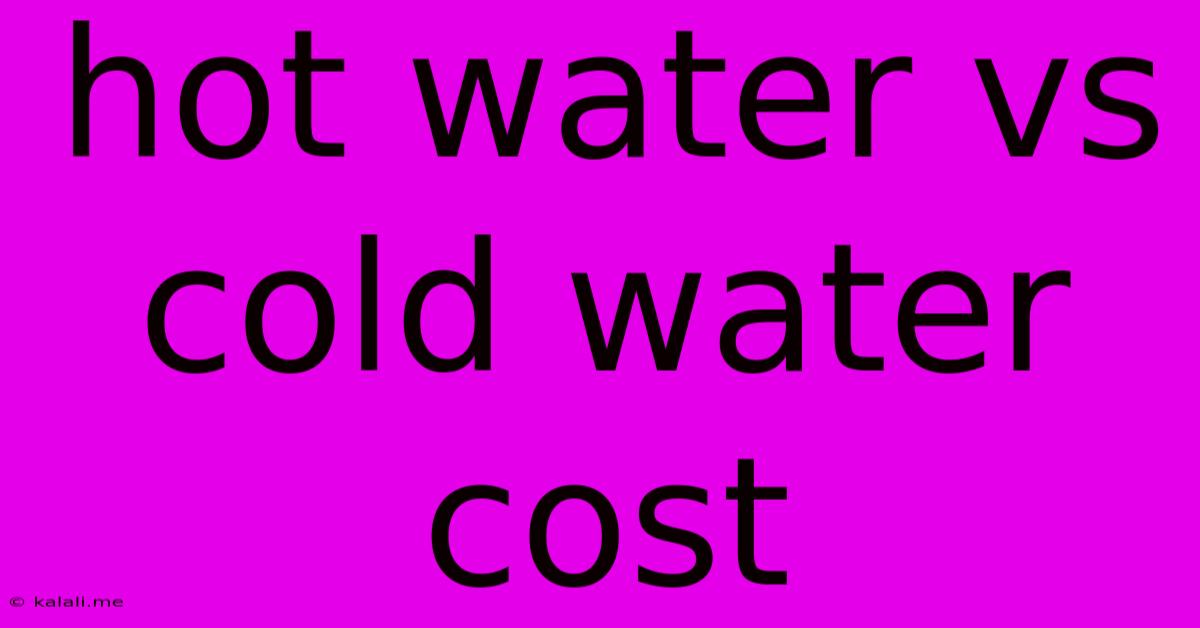Hot Water Vs Cold Water Cost
Kalali
May 31, 2025 · 3 min read

Table of Contents
Hot Water vs. Cold Water: Unveiling the True Cost
Choosing between hot and cold water might seem trivial, but the impact on your wallet can be surprisingly significant. This article delves into the hidden costs associated with heating water, comparing hot and cold water usage in various household applications and offering strategies for minimizing your water heating expenses. Understanding these differences can help you make more informed decisions about water consumption and significantly reduce your utility bills.
The Energy Hog: Heating Water's Hidden Costs
The primary cost difference between hot and cold water boils down to energy consumption. Heating water requires a substantial amount of energy, whether through gas, electricity, or other fuel sources. This energy consumption directly translates to higher utility bills. The cost varies depending on your energy source and the efficiency of your water heating system – factors we'll explore further. Consider these points:
- Water heating accounts for a significant portion of household energy bills: Depending on your climate and usage habits, it can easily represent 15-30% of your total energy consumption.
- Different heating systems have varying efficiencies: Gas water heaters are generally more efficient than electric ones, but their initial cost is higher. Heat pump water heaters are becoming increasingly popular due to their high efficiency, though they might have a higher upfront investment.
- Water heater size and insulation: A larger water heater or one with poor insulation will consume more energy to maintain the desired temperature. Regular maintenance, including flushing sediment, can improve efficiency.
Hot Water Usage: A Detailed Breakdown
Let's examine the typical household uses of hot water and their associated costs:
- Showers: Longer showers consume more hot water, leading to higher energy costs. Switching to shorter, more efficient showers is one simple way to save.
- Dishwashing: Using a dishwasher is often more water-efficient than washing dishes by hand, but using the correct water temperature setting plays a significant role.
- Laundry: Washing clothes with hot water generally consumes more energy than using cold or warm water. Modern detergents are designed to work effectively in cooler temperatures.
- Bathroom sinks and cleaning: Hot water is often used for cleaning tasks around the bathroom, which can contribute to overall hot water usage and costs.
Cold Water: The Budget-Friendly Choice
While cold water doesn't incur the direct cost of heating, indirect costs related to water treatment and delivery still exist. However, these are generally far less significant compared to the energy expenditure for heating. Using cold water for:
- Drinking: Drinking cold water directly from the tap avoids the energy waste of heating water you don't need.
- Laundry: Cold water washing is a highly effective way to reduce energy consumption and save money.
- Gardening: Using cold water for watering plants is environmentally friendly and cost-effective.
Strategies for Minimizing Hot Water Costs
Several strategies can help you reduce your hot water costs significantly:
- Install low-flow showerheads and faucets: These fixtures reduce water flow without compromising water pressure.
- Take shorter showers: Even a few minutes less can make a big difference over time.
- Use cold water whenever possible: Opt for cold water for washing clothes and dishes whenever feasible.
- Fix leaky faucets promptly: A dripping faucet wastes both hot and cold water, leading to unnecessary costs.
- Insulate your water heater: This helps retain heat and reduces the energy required to maintain the desired temperature.
- Lower your water heater's thermostat: A slightly lower temperature can save a significant amount of energy without compromising hot water availability.
Conclusion: A Balanced Approach
While cold water clearly offers lower direct costs, hot water is necessary for hygiene and certain household tasks. The key is to find a balance. By implementing the strategies mentioned above and being mindful of your hot water consumption, you can significantly reduce your energy bills while maintaining a comfortable living environment. The conscious effort to conserve energy and water translates directly to financial savings and a smaller environmental footprint.
Latest Posts
Latest Posts
-
3 Wire To 2 Wire Laptop Charger
Jun 01, 2025
-
Was His Late Father Vs Is His Late Father
Jun 01, 2025
-
How Long For Stain To Dry
Jun 01, 2025
-
Can An Image Be A Different Shape Than A Rectangle
Jun 01, 2025
-
How To Seal Wood For Outdoor Use
Jun 01, 2025
Related Post
Thank you for visiting our website which covers about Hot Water Vs Cold Water Cost . We hope the information provided has been useful to you. Feel free to contact us if you have any questions or need further assistance. See you next time and don't miss to bookmark.